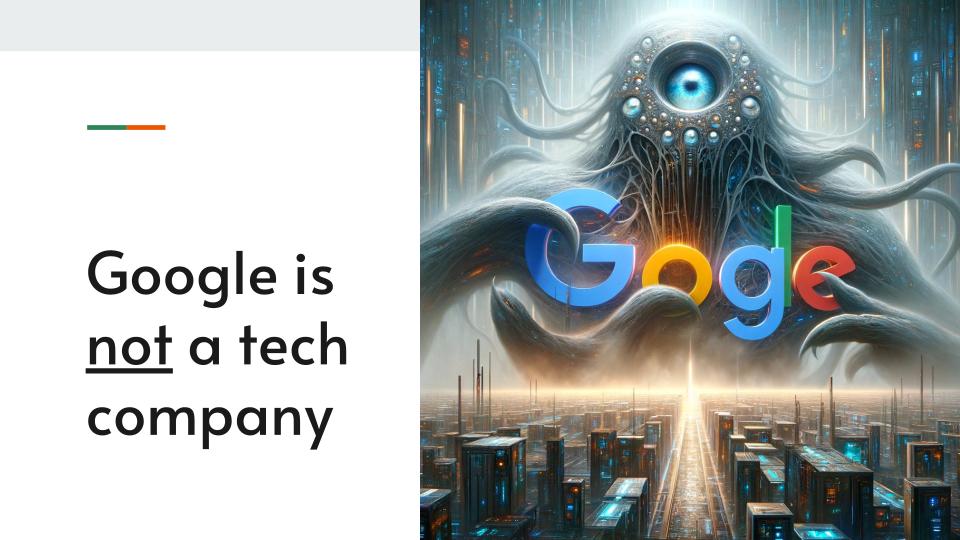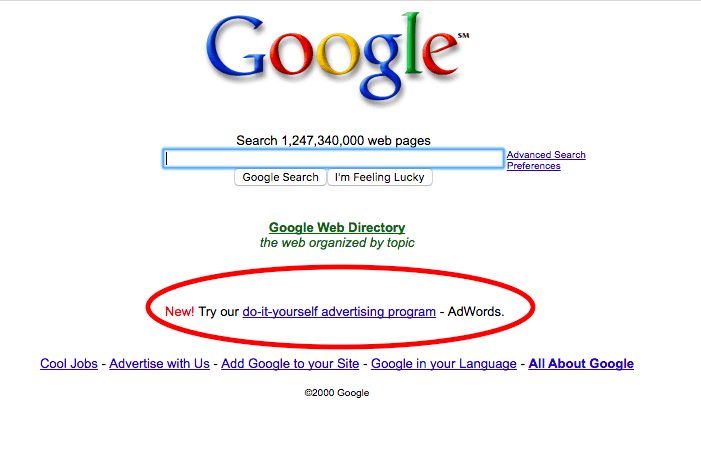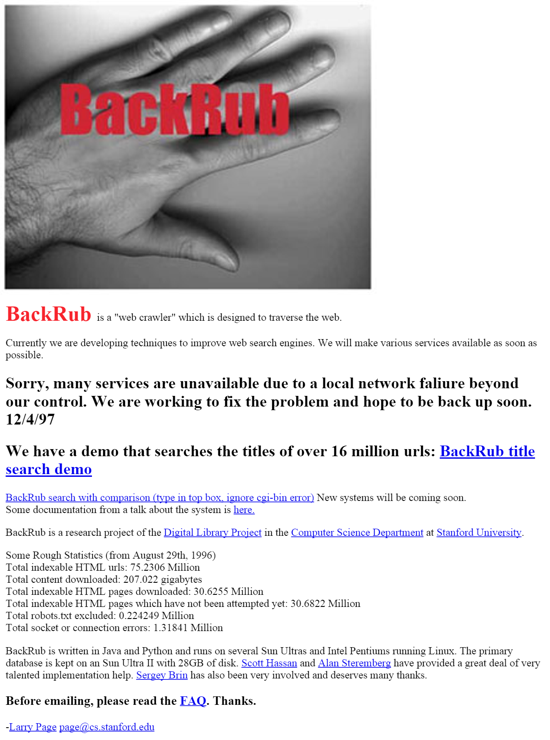Google is not a tech company

On 24 January 2023, the US Department of Justice filed a civil antitrust suit against Google for 'monopolizing multiple digital advertising technology products'. On 27 September 2023, Google celebrated 25 years of existence.
In honour of all things Google, I want to argue that Google is not a tech company. Google is an advertising company that uses technology to corner and dominate the ad market.
Introduction
Google's Beginnings

Google was founded in 1998 by Larry Page and Sergey Brin, two PhD students at Stanford University. The company's initial product was a search engine that ranked web pages based on the number of other pages that linked to them. This algorithm, called PageRank, was the basis for Google's early success. By 2000, Google was the world's largest search engine, and it has remained the dominant search engine ever since.
Google's "first" ad

Google's first ad appeared in 2000, and by 2001, Google had launched its self-service advertising platform, AdWord. AdWords allowed advertisers to purchase ads that would appear alongside search results. Advertisers could choose which keywords would trigger their ads, and they would only pay when users clicked on their ads. This pay-per-click model was revolutionary, and it allowed Google to quickly dominate the online advertising market.
From I'm Feeling Lucky: The Confessions of Google Employee Number 59 By Douglas Edward
A tech company?
If it quacks like a duck...
Let's start with a simple question: Is Google a tech company? The answer is obviously yes. Google is a tech company. It makes technology. It sells technology. It provides technology services. It invests in technology research and development. It has a tech-based revenue model. It provides tech-based customer support. It is a tech company.
Let's pick a few other companies to compare Google to. IBM, Microsoft, on the one hand, and Ogilvy, WPP, on the other hand;
And let's start with a simple matrix; a simple comparison of the companies based on a few criteria. Let's start with the criteria of a tech company:
| Criteria | IBM | Microsoft | Ogilvy | WPP | |
|---|---|---|---|---|---|
| Technology Development | ✔️ | ✔️ | ✔️ | ❌ | ❌ |
| Tech Product Sales | ✔️ | ✔️ | ✔️ | ❌ | ❌ |
| Tech Services | ✔️ | ✔️ | ✔️ | ❌ | ❌ |
| R&D Investment | ✔️ | ✔️ | ✔️ | ❌ | ❌ |
| Tech-based Revenue | ✔️ | ✔️ | ✔️ | ❌ | ❌ |
| Tech Customer Support | ✔️ | ✔️ | ✔️ | ❌ | ❌ |
Clearly a good match. Google must be a tech company.
If it quacks like a duck and walks like a duck...
But what if it quacks like a duck and walks like a duck but is actually a goose? Let's look at another set of criteria. Let's look at the criteria of an ad company:
| Criteria | IBM | Microsoft | Ogilvy | WPP | |
|---|---|---|---|---|---|
| Ad Campaign Creation | ❌ | ❌ | ✔️ | ✔️ | ✔️ |
| Media Buying Services | ❌ | ❌ | ✔️ | ✔️ | ✔️ |
| Brand Strategy | ❌ | ❌ | ✔️ | ✔️ | ✔️ |
| Market Research | ❌ | ❌ | ✔️ | ✔️ | ✔️ |
| Ad-based Revenue | ❌ | ❌ | ✔️ | ✔️ | ✔️ |
| Client Brand Consulting | ❌ | ❌ | ✔️ | ✔️ | ✔️ |
Explanation of Matrices
-
IBM and Microsoft both show a strong alignment with the criteria of a tech company, emphasizing technology development, product sales, and tech services.
-
Google shows characteristics of both a tech and an ad company. While it has significant investments in technology and tech-based services, a large portion of its revenue and business operations align with advertising activities.
-
Ogilvy and WPP are aligned with the ad company criteria, focusing on advertising services, brand strategy, and client consulting, without the technological product development and services that characterize tech companies.
These matrices help visualize where each company falls in the tech vs. ad spectrum, clearly illustrating the hybrid nature of Google's operations compared to the more traditional roles of companies like IBM, Microsoft, and Ogilvy/WPP.
Follow the money
If it quacks like a duck and walks like a duck but is actually a goose...
How can we tell if Google is a tech company or an ad company? Let's look at the revenue breakdown of each company. Let's see where the money comes from. Let's follow the money.
| Revenue Source | IBM (%) | Microsoft (%) | Google (%) | Ogilvy (%) | WPP (%) |
|---|---|---|---|---|---|
| Technology Products & Services | 80% | 65% | 20% | 0% | 0% |
| Software & Cloud Services | 20% | 30% | 15% | 0% | 0% |
| Advertising & Marketing Services | 0% | 5% | 60% | 100% | 100% |
| Data Analytics & Other Services | 0% | 0% | 5% | 0% | 0% |
Key Insights:
-
IBM: Primarily generates revenue from technology products and services, along with a significant portion from software and cloud services.
-
Microsoft: Has a diverse revenue stream that includes technology products, software, cloud services, and a small percentage from advertising (mostly from its online services like Bing and LinkedIn).
-
Google: A significant majority of its revenue comes from advertising and marketing services (primarily through its search engine and YouTube), aligning it more closely with ad companies.
-
Ogilvy and WPP: Their revenues are almost entirely from advertising and marketing services, with no contribution from technology products or software services.
This breakdown demonstrates that while Google does have a notable presence in technology (via products and cloud services), its revenue model is much more similar to that of ad companies like Ogilvy and WPP, with a heavy reliance on advertising for its income. This is in contrast to IBM and Microsoft, which primarily rely on technology products, software, and services for their revenue.
Conclusion
If it quacks like a duck and walks like a duck, it's probably a duck. But what if it quacks like a duck and walks like a duck but is actually a goose? Google is a goose. It quacks like a tech company and walks like a tech company, but it is actually an advertising company. Google's business model is based on advertising, and it uses technology to dominate the ad market. Google is not a tech company.
Bonus: Google before "Google"
Google's original name was Backrub. The name was changed to Google in 1997. The name was inspired by the word googol, which is a mathematical term for the number represented by the numeral 1 followed by 100 zeros. The use of the term reflects their mission to organize a seemingly infinite amount of information on the web. The name was chosen because it was short, easy to spell, and easy to remember.

What do you think?
Is Google a tech company or an advertising company? Let me know in the inbox.
